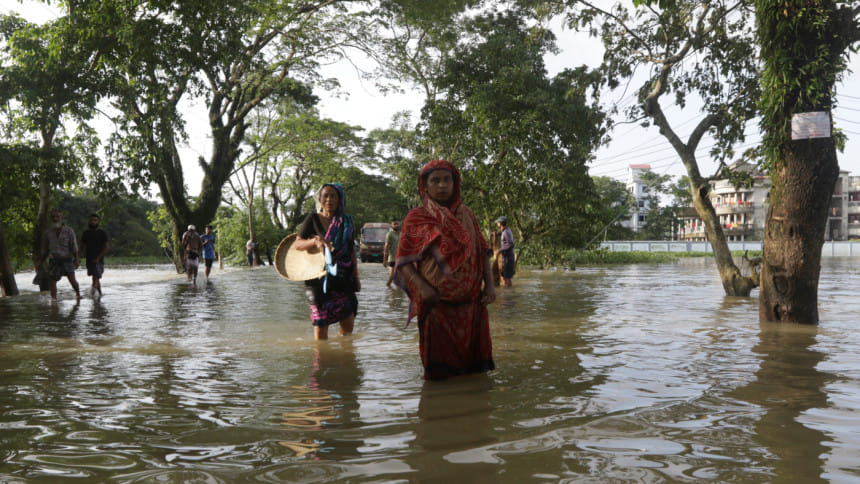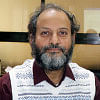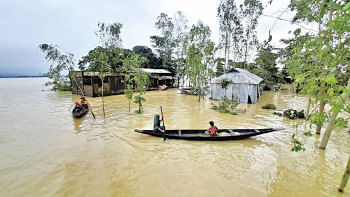Flood management in Sylhet: We can't fight a battle with 'wet gunpowder'

This flood is not yet over. The monsoon season now lasts till October, and in the second or last week of July, there is a risk of more major flooding in different parts of Bangladesh. But are we really prepared to tackle it?
I was talking to a group of people in a school-turned-flood-shelter to find out the answer to the above question. "We had everything to win the battle of Plassey, but the gunpowder was wet. That's how I feel about our capacity for flood management. Yes, there was unprecedented rain in the shortest possible time, but that doesn't justify the fall of the airport, medical installations, rail stations, and power distribution system," said Abul Hashem (not his real name), a retired headmaster from Dharmapasha upazila.
I could not disagree with him.
Bangladesh boasts having a modern weather monitoring system and robust geostationary satellites under SPARRSO (Bangladesh Space Research and Remote Sensing Organization). But does it hold up during our time of need? We have the technology, understanding, and capacity to calculate the travel time of rainwater from the upstream Cherrapunji to Sylhet. If this information had been made available to the general public with a bit of specific analysis, it would be easier for the citizens to take action.
What is the benefit of maintaining the organisations and their human resources if they cannot understand the danger of 22,000mm of rainfall upstream in only three days' time? Or if they can't predict the consequences of 24 hours of continuous rain in Sunamganj? Or predict which area will be submerged if the Surma River overflows in the absence of a town protection embankment? All these should be part of the forecast and warning system.
No doubt, Bangladesh has achieved remarkable success in disaster management, especially for cyclones. We often introduce ourselves as a role model in the field of disaster management. Our development partners and many pundits of disaster management also admit the same. To make our case, we refer to the cyclones of the 1970s and the death tolls, which have fallen from seven-digit numbers to single-digit tolls over the last 50 years. Mathematically, this checks out. But it is also true that, after 1991, the landfall of cyclones and hightide have never coincided. So, the room for complacency is very little in this respect.
One of my former students (a disaster management student at Dhaka University), who is a survivor of the flood and waterlogging in Sunamganj, could not find any similarities between what she had learnt about our capacity in disaster response and the real-life situation. She wrote with great disappointment: "We only have the empty sound of the term 'role model!' Such terms only exist in workshops, class lectures, panel discussions, or on a talk show. Please send me the medals we have received so far for being a 'role model.' Perhaps I could eat those soaked in water." She could be wrong in some respects, but her misery and disappointment are justifiable.
We seem unwilling to learn from or admit to any mistakes as we climb up the high branches of the tree of complacency. In the minor flood of May, several power substations in Sylhet stopped working because they got inundated. After the water receded, nothing was done to protect the substations from future flooding. We could have at least built temporary embankments with soil and sandbags. If we had done that, we would not have had to fumble with the operations at Kumargaon Power Station.
On the other hand, even in the midst of this flood, the mayor of Sylhet, along with the army, secured the Kumargaon Power Station. That means it is possible to take action if only one is willing to. But is there a disaster contingency plan for Sylhet city? Who will be in command when handling city-wide crises due to natural calamities or crises caused by human error?
We witnessed the helplessness of the power distribution system of the entire Sylhet region as soon as the floods began. For many years, experts have been saying that the process through which our rural power system has developed, evolved, and expanded has gradually made the system itself fragile.
Our fear that this rural power distribution system – which is based on a populist, propaganda-driven, and politicised philosophy – will fail to keep its bare minimum services running during any disaster has now come true. Power distribution substations under the Bangladesh Rural Electrification Board (BREB) were affected as soon as flood water entered the Sylhet region. The substation is a very important installation, and its location should be in a technically appropriate area. But since these visible installations catch the eye of powerful politicians, who attempt to install them in their constituencies, they were often installed without heeding issues of technical suitability or standards. Instead of gaining the ability to ignore such political pressure, the BREB has often given in to the political pressure.
Not only that, even in the case of the construction of power distribution lines, the technical standards of rural electricity and social considerations are not very sustainable. That is why consumers of rural electricity never get uninterrupted electricity, despite there being enough power generation. More caution and prudence are needed in building electrification infrastructures in Bangladesh's flood-prone areas. A power system is actually the main driving force behind all our service sectors. This time, we have witnessed how redundant the telecommunication system and emergency medical services can be without electricity.
The unprecedented flood has destroyed people's confidence. When people lose self-confidence, they lose everything. We have to bring it back. No traditional response will help this time. You cannot buy "confidence-building materials" at the relief shops. It is the political will and democratic institutions that can bring back people's confidence. We have to be innovative and people-centred in our disaster response. Let the people decide their needs and select their priorities. Let's create space for people's participation in disaster management. Let's have fresh gunpowder instead of wet and damp one, as was the case in Plassey.
Gawher Nayeem Wahra is founding convenor and member secretary of Bangladesh Disaster Preparedness Forum (DF).

 For all latest news, follow The Daily Star's Google News channel.
For all latest news, follow The Daily Star's Google News channel. 





Comments